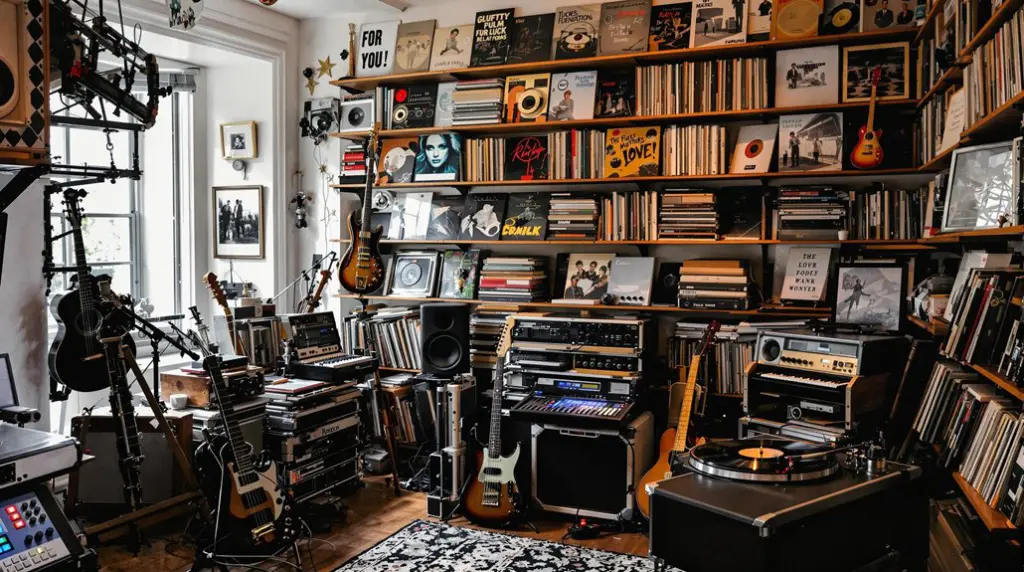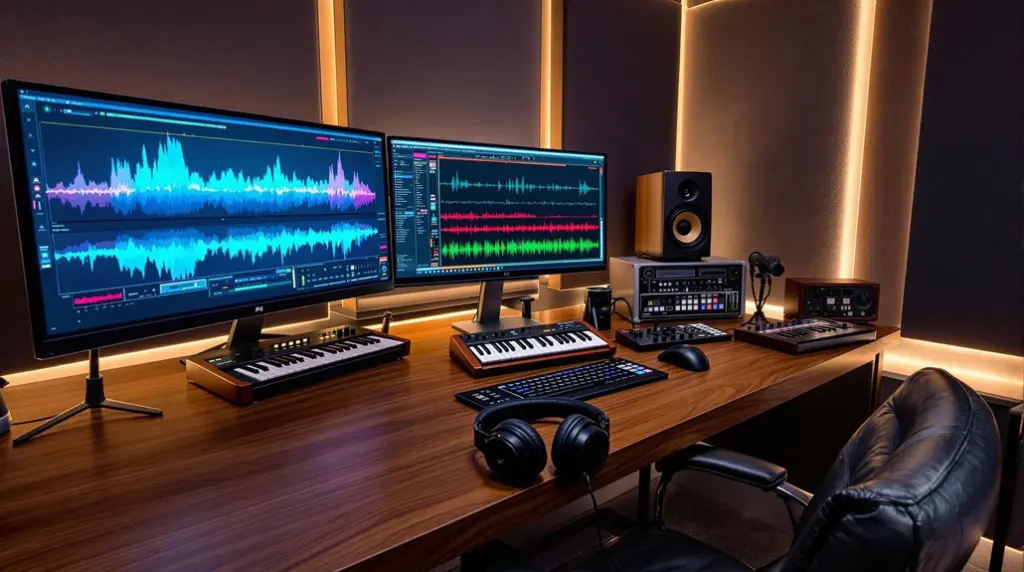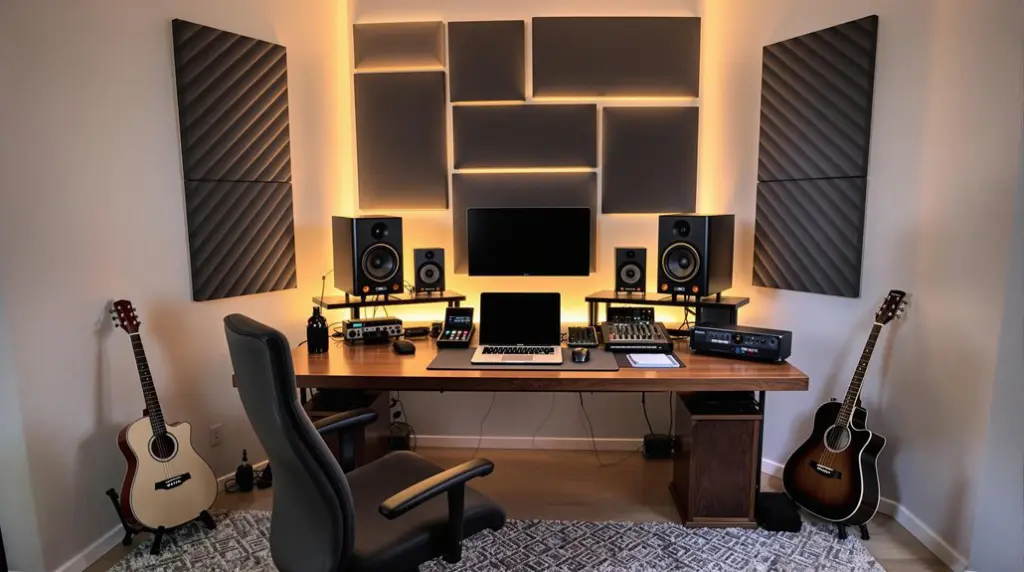Crafting a structured routine is essential for music producers seeking to enhance creativity and efficiency. Begin with a mindful morning, avoiding screens and incorporating hydration, nutrition, meditation, and journaling. Set up your gear meticulously—ensuring all software and hardware are optimized. Schedule focused creative sessions in the morning and use breaks to maintain mental clarity. Manage emails, explore new music trends, and organize your sound library for fresh inspiration. Dedicate afternoons to routine tasks and evening hours to intense work like mixing and sound design. Conclude with an end-of-day review to reflect and prepare for continuous growth. Discover deeper insights and refine your workflow.
Key Takeaways
- Begin your day with mindful activities like meditation and journaling to enhance focus and set clear daily goals.
- Organize your workspace and manage your gear effectively, ensuring a clutter-free and efficient production environment.
- Schedule focused creative sessions in the morning with regular breaks to maintain high energy and prevent burnout.
- Respond promptly to emails and maintain detailed documentation of project progress for efficient communication and workflow.
- Explore new music and manage your sound library with tags and filters to stay inspired and incorporate fresh elements into your work.
Morning Rituals
Although the demands of a music producer’s life can often be overwhelming, establishing effective morning rituals can set the stage for a productive and inspired day. A mindful awakening begins with avoiding phone usage for the first hour. This simple act enhances motivation and mood, fostering a more focused and productive mindset.
Hydration is also essential; drinking water immediately upon waking kickstarts your metabolism, preparing both body and mind for the day’s creative endeavors.
A light breakfast, such as a granola bar or pop tart, supplies essential energy without weighing you down. This fuels your morning activities, ensuring you are ready to tackle the tasks ahead.
Meditation, practiced for 10 to 30 minutes, greatly reduces stress and enhances focus. By clearing your mind, meditation sets a positive tone for your creative sessions, allowing for a more seamless flow of ideas. Incorporating practices like analyzing modal interchange in your morning routine can also inspire innovative musical expressions.
Journaling or blogging in the morning provides mental clarity and helps establish specific daily tasks. This practice not only organizes your thoughts but also solidifies your goals, setting a clear path to achieve them.
Integrating these elements into your morning ritual cultivates a productive mindset, empowering you to excel in your music production journey.
Setting Up Gear
With your morning rituals establishing a solid foundation for the day, the next step in your workflow is setting up your gear effectively.
Begin by connecting your audio interface to your computer, verifying that all necessary drivers are installed for peak performance. Regularly update drivers to maintain compatibility and functionality with your DAW. This vital step in gear maintenance guarantees seamless operation during your sessions.
Next, configure your Digital Audio Workstation (DAW) by adjusting the audio settings, selecting the correct input and output devices, and fine-tuning buffer sizes for low latency. This meticulous setup enhances the responsiveness of your system, allowing for a smoother creative process.
Organize your workspace by designating specific areas for your gear. Position studio monitors, MIDI controllers, and microphone stands strategically to reduce clutter and improve efficiency.
Effective cable management is important; use labeled cables and power strips to keep connections neat and identifiable. This practice not only simplifies troubleshooting but also contributes to a professional studio appearance.
Regularly test your setup to confirm all components are functioning correctly. Make necessary adjustments to gear placement to enhance acoustics and accessibility.
Creative Sessions
Establishing a robust creative session is vital for music producers aiming to harness their peak energy levels and minimize distractions. Session planning is essential, particularly when setting focused time blocks in the morning hours (0700-1200). This period often aligns with high-energy levels, providing a prime window for creative inspiration.
A well-structured work session, such as dedicating specific time (e.g., 9 AM to 11 AM) for songwriting or sound design, enhances productivity and creativity. Integrating regular breaks every 60-90 minutes can prevent burnout and maintain sustained focus.
| Time Block | Activity | Objective |
|---|---|---|
| 0700-0800 | Journaling/Blogging | Enhance mental clarity |
| 0800-0900 | Collaboration | Inspire new ideas |
| 0900-1100 | Songwriting | Develop new material |
| 1100-1200 | Sound Design | Experiment with sounds |
Collaboration with other musicians during these sessions can foster learning and provide accountability to overcome creative lulls. Tools like journaling before starting a session can set a positive mindset, enhancing mental clarity and focus. By meticulously planning and adhering to these structured sessions, music producers can tap into their highest levels of creative inspiration and productivity, ensuring their artistic output remains consistent and innovative.
Email Management
Effective email management is a cornerstone for maintaining seamless communication in the fast-paced world of music production. As a music producer, timely responses to collaborators, labels, and clients are essential to prevent project delays and missed opportunities.
A structured approach to email organization can greatly enhance workflow continuity and reduce distractions. Utilizing tags and filters in your email client is an important strategy for streamlining communication. By categorizing correspondence related to specific projects or deadlines, you can track critical information effortlessly.
Implementing inbox strategies such as creating folders for urgent matters, pending responses, and completed tasks will keep your workspace efficient and clutter-free.
Regularly monitoring your inbox for new project proposals and demo submissions is crucial to stay abreast of potential collaborations and industry opportunities. Setting aside dedicated time slots for checking and responding to emails guarantees that you remain focused on production tasks without constant interruptions.
Maintaining a clean and organized email inbox safeguards against data loss and allows quick access to important files and correspondence. This is indispensable for efficient project management, ensuring that you can retrieve necessary information swiftly, thereby keeping your creative process fluid and uninterrupted.
Discover New Music
Discover New Music
In the dynamic landscape of music production, discovering new music is an essential practice that fuels creativity and keeps your sound fresh and relevant. Integrating music exploration and trend analysis into your daily routine can greatly enhance your work, ensuring you stay ahead in this ever-evolving industry.
Reading thorough tutorials on digital audio workstations can also provide new insights into how to better organize and manipulate your sound library. Here are four effective strategies to help you achieve this:
- Follow Producers on Soundcloud: By following other producers on platforms like Soundcloud, you can continually discover fresh sounds and stay updated on current trends in music production. This community-driven approach allows you to immerse yourself in a variety of genres and styles.
- Check Popular Music Blogs and Websites: Regularly visiting music blogs and websites is a valuable resource for uncovering new tracks and emerging artists. This habit not only broadens your musical horizons but also enriches your music library with diverse influences.
- Attend Music Festivals: Festivals are a goldmine for music discovery. They provide a live experience of new music and also present opportunities for networking with fellow musicians, which can lead to future collaborative projects.
- Utilize Tags and Filters in Your DAW: Leveraging the tools available in your DAW for organizing and accessing new sounds can streamline your creative process. Tags and filters help you efficiently manage your sound library, making it easier to incorporate new elements into your projects.
Collaboration Time
Collaboration time with fellow musicians and producers is an invaluable component of a music producer’s routine, offering a fertile ground for creativity and innovation. Engaging in collaborative projects fosters creativity, enhances learning opportunities, and can lead to fresh ideas that may not emerge during solitary work sessions.
Employing effective collaboration techniques, such as shared brainstorming sessions and co-writing activities, can accelerate the creative process and yield unique musical pieces. Incorporating interactive call-and-response techniques during collaborative sessions can further enhance engagement and creativity.
Clear communication strategies are vital during these collaborations. Articulating goals and responsibilities guarantees that all participants are aligned, minimizing misunderstandings and maximizing productivity. Regular check-ins and feedback loops can further streamline the collaborative process, allowing for continuous improvement and refinement of ideas.
Moreover, collaboration time often presents invaluable networking opportunities. Working with others exposes you to new audiences and resources within the music industry, broadening your professional network and potentially opening doors to future projects.
Scheduling dedicated collaboration sessions allows for focused, collective creativity, often resulting in the rapid development of new tracks and concepts. The accountability and motivation derived from working with peers can break creative lulls, guaranteeing consistent progress and maintaining high levels of enthusiasm and inspiration.
Taking Breaks
After a productive session of collaboration with fellow musicians, maintaining peak performance requires strategic downtime. Taking short breaks every 60-90 minutes is vital for recharging mental focus and preventing auditory fatigue during prolonged music production sessions.
The key lies in maximizing the effectiveness of these intervals. Regular breaks are necessary not just for mental rejuvenation but also for preventing ear fatigue, which can lead to temporary or permanent hearing damage if ignored.
Here are four strategies to enhance your break routine:
- Break Duration: Aim for breaks of 5-10 minutes. This brief pause is sufficient to refresh your mind without losing the momentum of your work.
- Snack Options: Opt for light snacks such as fruits, nuts, or yogurt. These provide a quick energy boost without causing the lethargy often associated with heavier meals.
- Quick Physical Activities: Simple exercises like stretching, a short walk, or even a few jumping jacks can rejuvenate your body and help prevent the stiffness that comes with long periods of sitting.
- Mindfulness or Relaxation Activities: Engage in deep breathing exercises or a short meditation session. These activities can reduce anxiety and foster a calm, focused mind, ready for the creative demands of music production.
Regularly scheduled breaks not only improve concentration but combat the significant drop in productivity often noticed post-lunch.
Afternoon Tasks
Recognizing the natural dip in post-lunch productivity, afternoon tasks should be strategically selected to maintain efficiency without overtaxing creative faculties. This period is ideal for tackling menial activities such as implementing editing techniques and refining bookkeeping strategies. These tasks demand attention but not the high levels of creativity and energy required for original production work.
Incorporating short breaks every 60-90 minutes during the afternoon guarantees that your mind and ears are well-rested, hence sustaining focus and creativity. Utilizing this time for project reviews or feedback sessions can enhance workflow continuity and provide motivation. Networking or brainstorming sessions can also be beneficial in the afternoon, fostering collaboration and stimulating new ideas without the pressure of immediate production deadlines.
To visualize an effective afternoon routine, consider the following table outlining potential tasks:
| Time Slot | Task | Purpose |
|---|---|---|
| 1:00 PM – 2:30 PM | Editing Techniques | Fine-tune audio and arrangements |
| 2:30 PM – 3:00 PM | Break | Rest mind and ears |
| 3:00 PM – 4:00 PM | Bookkeeping Strategies | Manage finances and administrative tasks |
| 4:00 PM – 4:30 PM | Feedback Session | Review projects with team or clients |
| 4:30 PM – 5:00 PM | Networking/Brainstorming | Foster collaboration and new ideas |
Evening Work
The evening hours, often hailed as a sanctuary of productivity for music producers, offer a unique window of opportunity for focused work. As daytime responsibilities wane, the evening ambiance provides a quieter environment, ideal for creative tasks.
This serene period, typically from 8 PM to 10 PM, becomes a canvas for nighttime inspiration, allowing producers to immerse in their craft without the distractions that populate daylight hours. Many producers harness this time to engage in activities such as mixing, sound design, or finalizing arrangements, leveraging the heightened focus and creativity that evening brings.
Incorporating techniques like equalization during these hours can further polish the sound and enhance overall audio quality.
Here are four key strategies to maximize your evening work sessions:
- Set Clear Objectives: Define specific goals for your evening sessions to maintain direction and purpose.
- Take Regular Breaks: Incorporate short breaks every 60-90 minutes to recharge and sustain concentration, preventing fatigue.
- Create a Relaxing Workspace: Cultivate an evening ambiance that inspires creativity, perhaps with dim lighting or calming music.
- Balance Productivity with Relaxation: Integrate leisure activities to avoid burnout, fostering renewed energy and continuous creativity.
Balancing productivity with relaxation is paramount. By structuring your evening effectively, you can transform these hours into a potent period of artistic advancement, fueled by the tranquility and inspiration of nighttime.
End-of-Day Review
Closing the day with a structured end-of-day review is essential for maintaining an efficient and productive workflow as a music producer. This involves meticulously saving and organizing your projects to prevent data loss and guarantee seamless access in future sessions.
Additionally, reflecting on daily goals utilizing SMART criteria helps to gauge progress and areas for enhancement. By adopting advanced audio processing tools, you can enhance your workflow and guarantee your work is of the highest quality.
Such a routine not only solidifies accomplishments but also sets the stage for continuous creative growth.
Save and Organize Projects
As the day draws to a close, dedicating time to save and meticulously organize your projects is an indispensable practice for any serious music producer.
This end-of-day ritual guarantees that your creative efforts are securely preserved and your workspace remains efficient for future sessions. Implementing a robust system for file backups and project categorization can greatly enhance your productivity and peace of mind.
Here are four essential steps to follow:
- File Backups: Always create multiple backups of your projects. Use external hard drives or cloud storage solutions to avoid catastrophic data loss.
- Project Categorization: Develop a consistent naming convention for your files and folders. Categorize projects by date, genre, or stage of completion to facilitate easy retrieval.
- Studio Cleanup: Spend a few minutes tidying up your workspace. Organize cables, put away instruments, and clear unnecessary clutter to start the next day with a fresh, focused environment.
- Document Details: Keep detailed notes on the progress and specific elements of each project. This documentation will aid in communication with collaborators and provide clarity when revisiting the project.
Reflect on Daily Goals
After securing your projects and organizing your workspace, the next step in refining your daily routine as a music producer involves a reflective end-of-day review. Conducting this review allows you to assess completed tasks and track your progress toward long-term objectives using the SMART criteria—Specific, Measurable, Achievable, Relevant, and Time-bound. This methodical approach to goal assessment guarantees that you remain focused and aligned with your overarching ambitions in music production.
A structured end-of-day review not only highlights your accomplishments but also identifies areas needing improvement. This continual progress tracking fosters a sense of achievement and encourages skill enhancement. Additionally, promptly reviewing feedback during your wrap-up session helps maintain workflow continuity and prevents potential project delays.
| Task | Goal Assessment | Progress Tracking |
|---|---|---|
| Mixdown Completion | Specific & Measurable | Achieved 75% |
| Sound Design Update | Achievable & Relevant | Completed |
| Client Feedback Review | Time-bound | Pending |
| Studio Cleanup | Specific | Completed |
Lastly, establishing a calming bedtime routine post-review can greatly enhance sleep quality, which is critical for maintaining focus and creativity in future sessions. By integrating these reflective practices, you not only cultivate a productive environment but also promote continuous growth in your music production journey.
Frequently Asked Questions
What Is the Daily Routine of a Music Producer?
A music producer’s daily routine encompasses morning activities to boost focus, high-focus tasks like mixing during peak energy hours, efficient email management, scheduled breaks, and end-of-day reflections, fostering creative inspiration and seamless collaborative projects.
How to Stay Organized as a Music Producer?
To stay organized as a music producer, implement a robust task management system and efficient project tracking. Regularly update and categorize your work files, maintain a tidy workspace, and use tagging and filtering in emails for streamlined communication.
What Is the Work Schedule for a Music Producer?
A music producer’s work schedule typically spans from 9 AM to 5 PM, integrating collaboration techniques and creative breaks. High-concentration tasks dominate mornings, while afternoons focus on less intensive duties, ensuring flexibility for spontaneous inspiration.
How Many Hours a Day Should I Practice Music Production?
Practicing music production for 2-3 hours daily, integrating focused practice techniques and productivity tips such as regular breaks, can greatly enhance skill development. Consistency is key, with shorter, concentrated sessions proving more effective for sustained creativity and progress.
Conclusion
In summary, structuring a day as a music producer involves a seamless blend of rituals and tasks that foster creativity and productivity. Morning rituals and gear setup set the stage for focused creative sessions. Effective email management and discovering new music guarantee professional growth, while regular breaks maintain mental clarity. Afternoon and evening tasks further drive project completion. Wrapping up the day with a review guarantees continuous improvement, solidifying the foundation for sustained artistic excellence.




